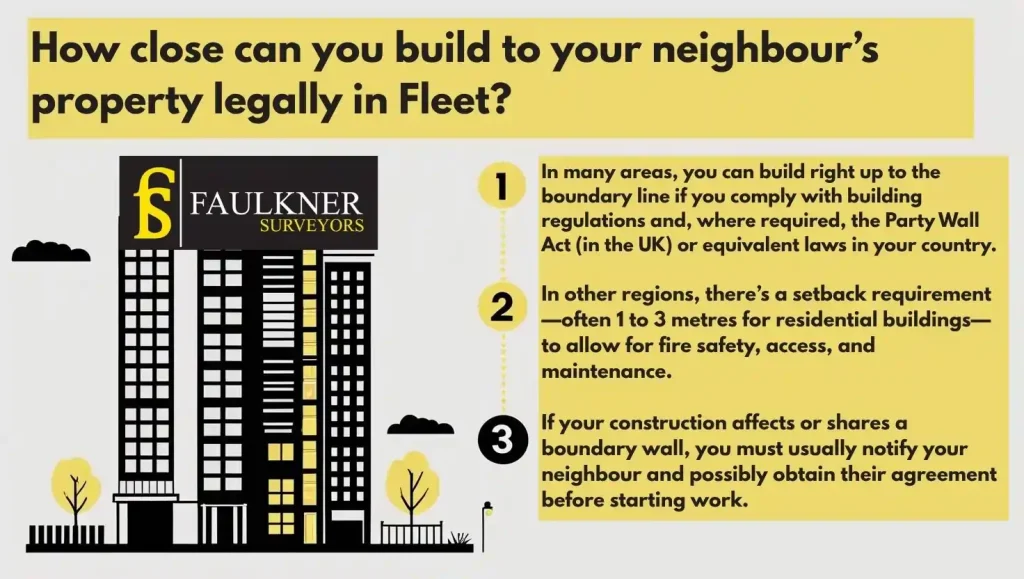Faulkner Surveyors
Faulkner Surveyors for Boundary Line Extension Fleet
If you are planning a boundary line extension Fleet, you are likely dealing with more than just bricks and mortar, you are dealing with rules, rights, and neighbours.
Faulkner Surveyors, we are here to make that process smooth and straightforward.
What is a boundary line extension, and does it need a Party Wall Notice?
A boundary line extension usually refers to extending or altering a wall or fence that separates your property from a neighbour’s. It might seem like a simple job—but it often brings up legal questions.
If the wall you’re working on is shared (a party wall) or if your extension is close to or on the boundary line, then yes—you may need to serve a Party Wall Notice. This is a formal document that informs your neighbour about the proposed work. It gives them the chance to consent or appoint a surveyor if they have concerns.
Not every boundary job needs a notice, but many do—especially if you’re digging near foundations, building up to the boundary, or altering a shared structure. It’s always safer to check beforehand. That’s where we come in—to guide you through the process, so you avoid trouble later.
How close can you build to your neighbour’s property legally?
This is one of the most common questions we hear—and the answer isn’t always straightforward. Generally, you can build right up to the boundary line of your land.
But if you’re planning to build on the boundary (or over it), or if your construction affects a shared wall, you’ll need to follow the Party Wall Act.
Even if your structure stays within your side of the line, if you’re excavating near your neighbour’s foundations (usually within 3–6 metres), a Party Wall Notice may be required.
Local planning rules may also apply, so it’s not just a matter of “how close,” but also “how it’s done.”
Our role is to help you stay on the right side of both the law and your neighbours. With our guidance, you’ll know exactly where you stand—literally and legally.
Want to Know More? 03300100262

Can a boundary wall extension lead to a dispute?
Yes, it definitely can, and unfortunately, it often does when people don’t realize how sensitive boundary work can be. You might think you’re just adding a little height to a wall or adjusting a fence, but if your neighbour sees it as crossing the line (figuratively or literally), things can escalate fast.
Disputes usually arise when:
- The exact boundary isn’t clearly defined.
- One side believes the wall or land belongs entirely to them.
- The work starts without proper notice or discussion.
The good news? These problems are preventable. At Faulkner Surveyors, we help clarify boundary lines before any building begins.
We also make sure any required notices are served properly and that your project respects everyone’s rights. It keeps things friendly, legal, and peaceful.
Who pays for the surveyor—me or my neighbour?
This can depend on a few things, but in most cases, the person doing the work (the building owner) pays the surveyor’s fees, especially if they’re the one serving the Party Wall Notice.
If both you and your neighbour appoint separate surveyors, you’re usually still responsible for both costs.
This is because you’re the one starting the work, and the surveyors are making sure your neighbour’s property is protected.
That said, there are situations where costs may be shared, particularly if the neighbour is also carrying out work at the same time or if there’s mutual benefit involved.
We always aim to keep costs fair and transparent, and we’ll explain your options clearly before anything begins.
Are your building works at risk without a party wall surveyor?
Yes, and more than you might think. Not having a party wall surveyor when one is needed can put your entire project at risk.
Here’s why:
- Legal delays: If your neighbour disputes the work or claims damage, things can be held up quickly.
- Unintentional damage: Without professional guidance, you could end up causing structural issues—especially when digging or altering a shared wall.
- Liability and cost: If things go wrong and you haven’t followed the Party Wall Act properly, you could be held responsible for repairs—and potentially legal fees, too.
- Neighbour fallouts: Even small misunderstandings can lead to long-term tensions with neighbours. A surveyor helps avoid that by keeping things neutral and professional.
Hiring a party wall surveyor doesn’t just tick a legal box—it protects your time, your budget, and your relationship with the people next door.
At Faulkner Surveyors, we make sure your building work starts on the right foot and stays on the right side of the law.
